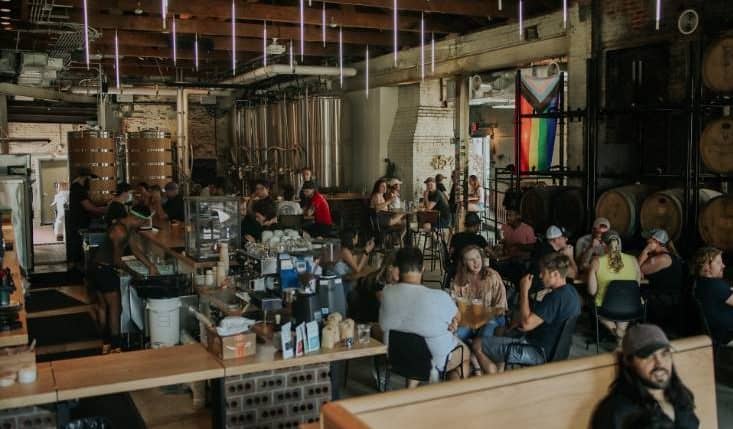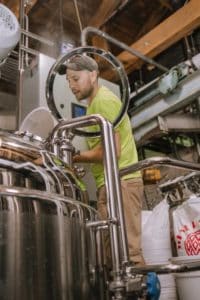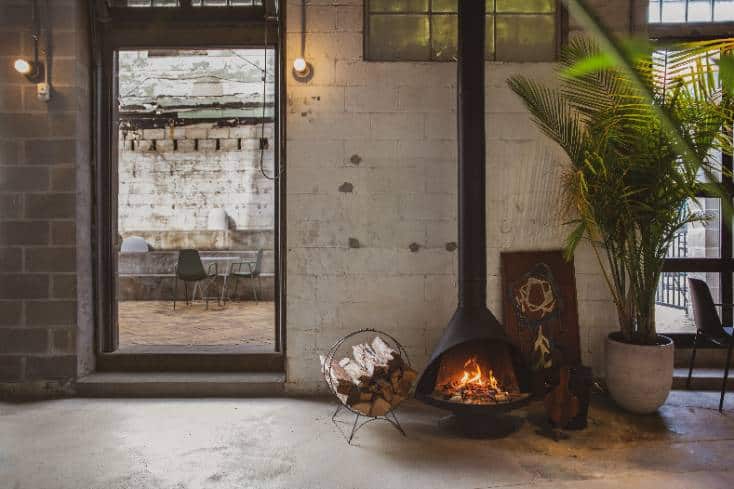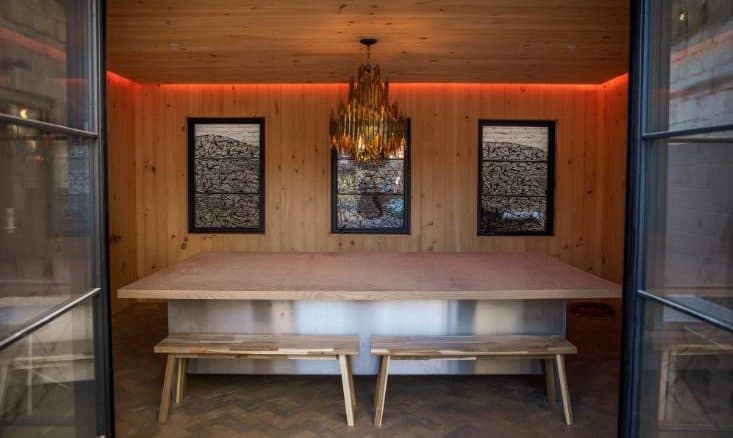
(David Kushner with daughter June)
American Craft Beer was recently invited to Pittsburgh to cover its impressive craft beer scene. And we spent an early afternoon drinking beer with Dave Kushner, the Founder of Trace Brewing.
And maybe it was because we all started drinking early, that he agreed to do a “5 Stupid Questions” with us, but we’re psyched to have him because Trace is doing some very interesting things in Pittsburgh and he’s a super interesting guy.
As much as we tried to limit things to our standard five question format there was too much we wanted to get into, so welcome to our first “5 Stupid Questions” where we neglected to count…
 ACB: We understand that you’ve a law degree so how did you get into brewing and were your parents pissed at you?
ACB: We understand that you’ve a law degree so how did you get into brewing and were your parents pissed at you?
Great question! Despite the fact I had spent 3 years of my life in law school and I was tens-of-thousands of dollars in debt, my parents were very excited and supportive of my career change. When I told my mom I was going to change careers to be a professional brewer, her first question was “what about your liver?!?” She could not have cared less about my law career and her only concern was about my health. If that isn’t love for your child, I don’t know what is!
ACB: As a Miami native who’s also lived in Washington, DC and Boston, what led to your decision to open a new brewery in Pittsburgh?
Like you mentioned, I was born and raised in South Florida. I’ve been visiting Pittsburgh for nearly 20 years. My former college roommate is from Pittsburgh and I would visit him during our school breaks. I fell in love with the city. My wife was born and raised in Morgantown, WV, which is only 60 miles from Pittsburgh and in 2016 we moved to Pittsburgh from Boston. Since Pittsburgh is our home and the city we love, it was a natural progression to open a brewery here.
ACB: Tell us about Trace Brewing. What’s your business and brewing philosophy? Is there an essential characteristic that you think defines what you do and the beers that you produce?
Trace Brewing is a 10-barrel brewery, taproom, coffee shop, and event space in the heart of the Bloomfield neighborhood in Pittsburgh. Our goal is to create an inclusive environment that is welcoming to all our guests. We believe both our space and our products need to be as inclusive as possible. We built gender-neutral bathrooms, we frequently host Drag Brunches and Drag Bingos, and Trace was an official celebration location for the Pittsburgh Pride Festival.
As for our beers, we brew a wide variety of beers that can be enjoyed whether you are a huge beer nerd or if you just casually enjoy beer. Our brewers have worked for breweries throughout New England, the Midwest, and Pittsburgh and have gained experience brewing something as clean and crisp as a Czech Lager, as flavorful as a New England IPA, as layered as a bourbon barrel aged Stout, or as wild as a spontaneous Saison brewed on our 15-barrel Koelschip. When you come to Trace, it is our hope there is a beer that speaks to your liking.

(Trace Taproom)
ACB: What’s your take on Pittsburgh’s Brewing scene? Is it different than what you experienced in Boston and if so, how?
Pittsburgh is one of the hottest beer cities in the country right now. We’ve had so many incredible breweries open in the last 5 years all making exceptional beers. The Pittsburgh Brewers Guild just released a “Brewery Trail Map” that helps you visualize how many amazing breweries we have in this city. A good number of them along the trail are within biking and walking distance from each other, so while you hop between breweries, you are also able to take in the beauty of the neighborhoods.
As for differences between Somerville (Remnant Brewing) and Bloomfield (Trace Brewing), there are more similarities than differences in the neighborhoods and surrounding city in which these breweries reside. Both cities have a rich history pre and post-Prohibition beer making, a young diverse populace that love to gather and share spaces with friends and strangers. We are fortunate at both breweries to have neighbors who have a strong pride in their local businesses and who come out to support us.
 ACB: Trace Brewing’s mentorship program with its emphasis on diversity is the talk of the industry. How did it come about and where do you see it going?
ACB: Trace Brewing’s mentorship program with its emphasis on diversity is the talk of the industry. How did it come about and where do you see it going?
The goal of the program is to diversify the American craft beer scene by giving folks who have historically been underrepresented in the brewing industry access to knowledge and training to jumpstart their brewing careers. We believe that the lack of diversity in our industry is a multifaceted issue, some of which are caused by a lack of outreach to underrepresented classes, breweries providing low or nonexistent wages, and entry-level brewing employees not receiving the skills and knowledge they need to compete in the highly-competitive brewing industry.
To combat these issues, we developed the Trace Brewing Vocational Program. The paid 6-month program trains each participant on all aspects of the brewing process including cellaring, packaging, quality control, and recipe formulation. The participants learn practical brewing skills directly from our brew staff. The brewing team, including myself, have worked at 15 different breweries and have a combined brewing experience of over 25 years. In addition to learning practical skills on the brew floor, participants follow a curriculum of study of brewing books, articles, and podcasts. By the end of the program, it is our hope that Trace’s vocational brewer will have the skills and knowledge to compete against other candidates who may have more professional experience or who have had the opportunity to attend a professional brewing program.

(Trace Fireplace Room looking out to its urban beer garden)
ACB: Trace Brewing is one of the most visually striking breweries we’ve ever visited. Your beer garden and Koelschip room for sour production are just two of its remarkable spaces. What went into the brewery’s design and can you touch on your graffiti art alley while you’re at it?
The building is a beautiful structure. There are traces of its prior uses everywhere you look. The building was originally used as a brass, bronze, and aluminum foundry. One of its defining features is a 30-foot tall vaulted ceiling built out of Old-Growth wood. We hung vertical white neon lights which visually look like they are “falling” from the rafters. These lights represent the sparks that used to fly in the building when it was a foundry. The building was also used for paint manufacturing, as a car garage, and was a popular underground punk music venue. The building has been used for both light industrial manufacturing and for a gathering place for the community of Pittsburgh. At Trace, we took a lot of inspiration from the building’s history and are proud to return it to a light industrial use and as a gathering spot for the community.
In October 2020, we opened the “Clement Freeway” which is the first public art wall in Pittsburgh. The wall is the outside of Trace’s building that abuts an alley, Clement Way. Anyone of any artistic ability is welcome to paint or spray paint on the wall. One of the cornerstone rules of the wall is to not get too attached to your work. It may be up there for weeks, or it could be painted over the next day. No one person owns the wall, it is truly for everyone. It’s been exciting to watch the Clement Freeway grow. Several of our adjoining neighbors have permitted the artists to use their walls for public art as well. The space feels more and more like a full graffiti alley. It’s a lot of fun watching these amazing artists create in real time. The wall has shown us that you can create a community in sometimes unsuspecting and underutilized spaces.

(Trace Koelschip room doubles as a private events space)
ACB: There’s so many great breweries doing interesting things in Pittsburgh…Can you share some of your favorites without getting into trouble?
I don’t play favorites. Every brewery in Pittsburgh is going to treat you to a completely different spatial and beer experience. I believe Pittsburgh has some of the coolest taprooms and beer gardens around. After visiting Trace, you could walk over to Two Frays Brewery and Cinderlands Foederhouse. Both locations are incredible environments with excellent beers. I’d recommend visiting the Millvale neighborhood and drinking the funky beers from Strange Roots Experimental Ales and then strolling down to drink some beers at the massive beer garden of Grist House Brewery.
In the Sharpsburg neighborhood, Hitchhiker Brewing is housed in this amazing industrial building that was an old Pittsburgh production brewery from the turn of the 20th century. Down the street is not only one of the best breweries in Pittsburgh, but I’d argue in the country, Dancing Gnome. They are about to complete their new brewery and taproom which is adjacent to their original location. If you’re in town, you need to drink some Dancing Gnome beers. Lastly, no trip would be complete without heading to Old Thunder Brewing in Blawnox. Their brewing team is made up of Pittsburgh brewing industry vets and the taproom is in this beautiful old post office building
(All image credits: Trace Brewing)
 American Craft Beer The Best Craft Beer, Breweries, Bars, Brewpubs, Beer Stores, And Restaurants Serving Serious Beer.
American Craft Beer The Best Craft Beer, Breweries, Bars, Brewpubs, Beer Stores, And Restaurants Serving Serious Beer.
